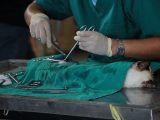
Top 10 Essential Vet Services Every Pet Parent Needs to Know
July 12, 2023As a responsible pet parent, you want the best for your beloved furry friend. They rely on you for their health and well-being, so providing them with essential veterinary services is crucial. This article covers the top 10 services you should be aware of to ensure your pet stays happy and healthy.
I. Vaccinations for pets
A. Types of vaccines – core and non-core
Vaccinations are a crucial part of veterinary care, helping to protect your pet from dangerous and potentially fatal diseases. Vaccines are divided into two categories: core and non-core. Core vaccines are essential for all pets, while non-core vaccines are recommended for certain pets depending on their lifestyle and risk factors.
B. Importance of regular vaccinations
Regular vaccinations protect your pet from infectious diseases and help keep the pet population in your community healthy. Maintaining a consistent vaccination schedule contributes to the overall well-being of all pets in your area.
C. Vaccination schedules for cats and dogs
Vaccination schedules for cats and dogs vary depending on factors like age and risk factors. Work with your veterinarian to create a customized vaccination plan for your pet to ensure they receive the protection they need.
II. Spaying/neutering
A. Benefits for your pet’s health and behavior
Spaying/neutering provides numerous health and behavioral benefits for your pet. It can reduce the risk of certain types of cancer, minimize aggressive behavior, and prevent overpopulation. Altered pets are also less likely to roam, reducing the risk of injury or accidents.
B. The optimal age for spaying/neutering
The ideal age for spaying or neutering your pet depends on factors such as breed and overall health. Discuss the best time for the procedure with your veterinarian to ensure optimal results.
C. Post-surgery care and recovery
Proper care and recovery are essential after spaying/neutering. Follow your veterinarian’s instructions for post-operative care to help your pet heal quickly and comfortably.
III. Microchipping
A. Purpose and benefits
Microchipping is a simple and effective way to give your pet a permanent form of identification. If your pet ever gets lost, a microchip can significantly increase the chances of a reunion. Microchips are also helpful in returning stolen pets to their rightful owners.
B. Implantation procedure
Microchipping involves inserting a tiny chip under your pet’s skin. The procedure doesn’t require anesthesia and is a relatively quick and straightforward process, much like receiving a vaccination.
C. Registering and updating information in microchip databases
Once your pet is microchipped, it’s crucial to register and update your contact information in the appropriate database. Keeping your information current ensures that your pet can be reunited with you if they ever get lost.
IV. Dental care for pets
A. The importance of dental health
Good dental health is essential for your pet’s overall well-being. Dental issues can lead to pain, infection, and even systemic health problems. Regular dental care, both at home and through professional cleanings, can help prevent these issues and keep your pet’s mouth healthy.
B. Dental disease prevention and diagnosis
Preventing dental disease involves regular teeth brushing, dental check-ups, and professional cleanings. Your veterinarian can help detect dental problems early on, preventing more severe issues and costly treatments.
C. Professional dental cleanings
Periodic professional dental cleanings are crucial to maintaining your pet’s dental health. These cleanings, performed by a skilled veterinarian, can remove plaque and tartar buildup, preventing potential complications.
V. Wellness exams
A. Importance of regular check-ups
Regular wellness exams are necessary for detecting health problems early and ensuring your pet receives appropriate care. These exams provide your veterinarian with an opportunity to monitor your pet’s overall health and recommend any necessary treatments or interventions.
B. Components of a wellness exam
A thorough wellness exam may consist of a physical examination, bloodwork, a dental check, and a review of your pet’s current medications and vaccinations. Your veterinarian may also discuss topics such as weight management, exercise, and nutrition during these exams.
C. Detecting and preventing health issues
By identifying health issues early on, your veterinarian can offer treatments to help avoid further complications, ensuring a better quality of life for your pet.
VI. Parasite prevention and control
A. Common parasites in cats and dogs
Parasites can cause severe health problems for pets if left untreated. Common parasites include fleas, ticks, heartworms, and intestinal parasites. Regular parasite prevention and control measures are essential for safeguarding your pet’s well-being.
B. Methods of prevention (collars, topical treatments, etc.)
There are various products and methods available for preventing and controlling parasites, including collars, topical treatments, oral medications, and injections. Work with your veterinarian to determine the best options for your pet.
C. Importance of regular fecal examinations
Fecal examinations are an essential diagnostic tool for detecting the presence of intestinal parasites in your pet. By regularly performing these tests, your veterinarian can identify and treat parasitic infections before they become severe.
VII. Vet Lab Services
Most veterinary clinics, such as Northwest Veterinary Clinic of Stanwood, provide in-house lab services. These services can include blood tests, urinalysis, skin scrapings, and more. Lab testing is essential for diagnosis and treatment plans, particularly when offering care for puppies and kittens in Stanwood. Regular lab testing can catch health issues early and ensure your pet receives the best possible care.
VIII. Northwest Veterinary Clinic of Stanwood
Northwest Veterinary Clinic of Stanwood offers a wide range of essential vet services, from wellness exams to complex surgeries. They have a team of experienced and compassionate veterinarians and staff who are dedicated to providing high-quality care for your furry family members. It’s crucial to have a trusted vet clinic like Northwest Veterinary Clinic of Stanwood to ensure your pet’s needs are met.
IX. Diagnostic imaging
A. Types of imaging (x-rays, ultrasounds, CT scans)
Diagnostic imaging is an essential tool for detecting and diagnosing various health issues in pets. Common types of imaging include X-rays, ultrasounds, and CT scans. These imaging techniques allow veterinarians to view your pet’s internal structures and identify abnormalities that may be causing issues.
B. Common reasons for needing diagnostic imaging
Diagnostic imaging may be required for various reasons, including injury, suspected foreign body ingestion, tumor detection, pregnancy confirmation, and more. If your veterinarian suspects an internal issue with your pet, they may recommend imaging to ensure an accurate diagnosis and appropriate treatment.
C. Benefits of early detection of health issues
Early detection of health issues through diagnostic imaging can lead to quicker treatment and a better prognosis for your pet. Imaging can also provide valuable information to guide treatment plans and monitor progress.
X. Pet Surgery
A. Overview of common surgical procedures
Veterinary surgery is a vital aspect of pet healthcare, with common procedures including spaying/neutering, dental surgery, orthopedic procedures, tumor removal, and emergency surgeries. Skilled veterinarians and staff at reputable clinics ensure your pet receives the best possible care during these procedures.
B. Preparing your pet for surgery
Before surgery, your veterinarian will provide you with detailed instructions on how to prepare your pet, such as fasting requirements and medication adjustments. It’s essential to follow these guidelines to ensure your pet’s safety and comfort during the procedure.
C. Recovery and post-operative care
After surgery, properly caring for your recovering pet is crucial. Your veterinarian will provide specific instructions for post-operative care, including medication administration, wound care, and activity restrictions.
XI. Veterinary Care for Seniors
Veterinary care for seniors is crucial to maintain their comfort and overall well-being. As pets age, they face unique health challenges, including arthritis, dental issues, and age-related diseases. Developing a comprehensive plan for geriatric care with your veterinarian can help address these challenges and ensure your senior pet remains healthy and comfortable.
XII. Conclusion
As a pet parent, it’s your responsibility to ensure your furry friend receives the best possible care. By understanding the top 10 essential vet services and working closely with a trusted veterinarian, you can maintain your pet’s health and happiness throughout its life. It’s essential to foster open communication and establish a strong relationship with your veterinarian to provide your pet with the care they deserve.




